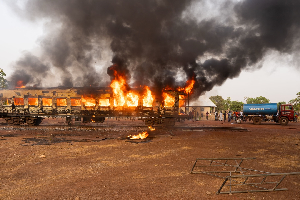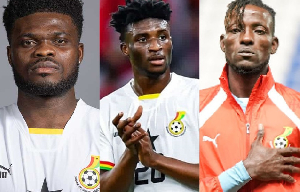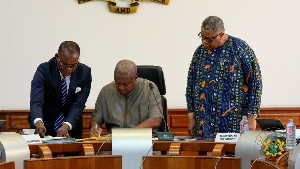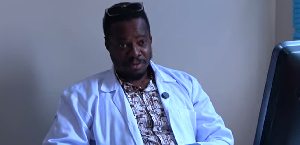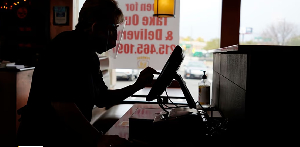By George Sydney Abugri
Every nation worth the name has its documented history outlining the struggles and achievements of its people. The history of a nation is usually incomplete without its great men, women and heroes and why not, its villains and scoundrels too.
When I mention heroes I am not referring to the type that would spit in the face of a drunken and uncontrollably enraged gunman with a trembling finger on the trigger or the type that would rush headlong at a charging bull to show how far bravery can go.
I am referring to that individual who earns the title through exceptional courage, noble acts, outstanding creativity and ingenuity, dedicated commitment to a course, good leadership and other contributions which bring a community or nation honour.
One reason Ghana does not seem to have heroes is that political opponents since the nation's independence have never acknowledged each other's more positive attributes, qualities, noble actions and contributions to national development.
Then too, ordinary individuals who have broken new grounds in their fields of endevaour and earned high acclaim domestically and internationally are rarely remembered let alone recognized.
Imagine that we gathered a fairly large crowd of Ghanaians representing a cross-section of various shades of political opinion and affiliation in the country and lined up before the crowd, small wooden statues of our heads of state from Kwame Nkrumah to John Mahama. If we pointed to the statues one after another, saying to the crowd each time, "If anyone thinks this man was a great man, raise your hand," many hands from the political parties they led would go up for each of them.
On the other hand, if we pointed to the statues one after the other saying each time, “anyone who thinks this man did a disservice to this nation and contributed to our woes should come out and push this statue down," all the statues would go down and there would be no hero among the nation's leaders, dead and alive.
Says a 26-year-old public servant in the port city of Tema: "When I was at school, I very much loved the military and resolved to join the army after school. In the meantime, I had read about famous war-time generals in Europe and America and 1 thought I should have a Ghanaian army general for a hero and a role model.
"I looked through some books, publications and old newspapers and came up with a list of Ghanaian army generals. One after the other they were rejected as heroes by adults 1 consulted. Scores of reasons were offered to explain why each of them did not merit the title of hero. "
That rancour, bitterness and uncompromising antagonistic political postures have stood in the way of an impassionate assessment of our national history and its heroes is bad enough. It will be even more sad though, if this endangers the accuracy of our nation's history.
I recall that when former head of state, General J.A. Ankrah died, someone wrote in the print media (with probable glee) how he informed a youngster, that General J.A. Ankrah was “that left, right, left, about turn, halt, azzoryah guy who booted Dr. Nkrumah overboard and set the ball rolling for the rape of Ghana by any person with a gun.”
Thankfully, General Ankrah had a hero who wanted to put the historical facts straight. This fellow countered in the media that at the time of the '1966 Coup, General Ankrah was not in the army and had no access to weapons, having been retired prematurely from the army a year before the coup.
As far as national leaders, statesmen and political giants go, one reason Ghana does not seem to have heroes is that political opponents since the nation's independence have never acknowledged each other's more positive attributes, qualities, noble actions and contributions to national development.
If Ghana is ever to have statesmen, political giants and national leaders for heroes, Ghanaians may have to learn to admit one profound truth: No leader can be perfect even if is true that there are always bad leaders.
Amid the economic hardships of the day, many Ghanaians seem so pre¬occupied with the daily concern for survival that they have very little time for much else. But some are able to find time for enemies. A lot of time for enemies, political enemies, especially.
The fact is that all major political events and struggles in the country before and since independence, no matter what negative impacts they have had on our socio-eco¬nomic advancement, provide interesting reference material for the future, once we get to understand what they were really about, how they were car¬ried out and what the ma¬jor actors in those political events were up to.
Anti-Nkrumaists seeking to reject Dr. Nkrumah as a hero and tarnish his image in the eyes of present and future genera¬tions have written enough damning material about the nation's first president to make huge bonfires for days. Yet the late Dr. Nkrumah is internation¬ally recognized as one of Africa's greatest heroes.
Dr. K. A. Busia was a gentleman intellectual of exceptional brilliance who made the nation proud in his day and was tolerant to the extent of letting students accost him rudely or take his chair at a public forum. But his detractors remember him as the overconservative who threw political opponents in the Civil Serve out of jobs and threw out Nigerian nation¬als.
Dr. Hilla Limman is considered a hero by supporters of the party he led and by his own people of Gwollu in the Upper West Region but not by other Ghanaians. Rawlings played his part as fate and circumstance determined and is also seen as a hero by many but certainly not by others. The same may be said about the late President J.E.A Mills.
While personal bias, political and sometimes ethnic prejudices are de¬nying the nation heroes among statesmen and leading politicians, lack of recognition and neglect are leaving the nation without great men, women and heroes in the areas of mu¬sic, herbal medicine, sports, traditional leadership, science, literature, community service etc..
Let us consider the case of football and the generation of footballers who won the African Nations Cup FOUR GOOD TIMES: Many people below the age of 35 may not have heard of Baba Yara. Today's children will grow up never knowing that Ghana ever had such a great footballer who brought Ghana continen¬tal fame and became a household name in the immediate post-indepen¬dence era. He died a vir¬tual pauper, emaciated from illness and left behind a destitute family.
In his day, he and col¬leagues Aggrey Fynn, Wilberforce Mfum, Dogo Moro, Salisu, Acquah and others were to Ghana what the Black Stars are today and probably much more. Unfortu¬nately, no streets, stadia or monuments bear their names. Great heroes in the area of football whose im¬ages have already been washed away with time's cruel tide.
If this nation is to sal¬vage the images of unrecognized or humiliated national heroes, dead or alive, it will mean look¬ing objectively at leading actors and events as they have unfolded since independence, keeping the actors and events in their true perspectives and judging tolerantly, if we must judge.
It would be most unfortunate indeed if journal¬ists, political analysts and researchers and other in-tellectuals who are producers of the raw material nec¬essary for the writing up of our history, should al¬low religious, personal, ethic or political prejudices to incline them towards being grossly unfair to opponents in a bid to deny them any claim to being national heroes.
Statesmen and political leaders among the nation's heroes and great men must have made mis¬takes, but then their mistakes constitute valuable lessons and guidance to all who are entrusted with the leadership of the na¬tion now and in the future.
{The author is Editor-In-Chief of the General Telegraph} Website: www.sydneyabugri.com/Web Email: editing@sydneyabugri.com
Opinions of Tuesday, 19 November 2013
Columnist: Abugri, George Sydney


